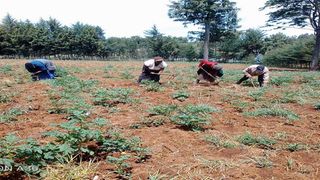
Workers weed Fiona Mwaniki’s potato farm in Nyahururu.
| PoolSeeds of Gold
Premium
Costly lessons I picked from telephone potato farming
What you need to know:
- I had my phone with me and I figured out that I would call and give a few instructions and know what was happening on the ground.
- Telephone farming is a recipe for failure because it is difficult to keep track of whether the various agronomic activities are being undertaken correctly.
For many years, I harboured the dream of farming having grown in a community in Nyahururu where the practice is the economic mainstay of many families.
So, I decided to actualise my dream few months ago by venturing into potato farming. The fact that I work in Nairobi as a climate change and monitoring and evaluation specialist with Kilimo Media International did not deter me.
Well, I had my phone with me and I figured out that I would call and give a few instructions and know what was happening on the ground.
For starters, potatoes are a very popular ingredient for many dishes around the world. They can be fried, boiled or included in stews and pies. This is another of the reasons that made me get into potato farming since I believed that with all these uses, I knew I could not lack market.
Thus, I teamed up with my sister to farm on one-acre that belongs to our parents in Nyahururu. We developed a budget and sought advice from agriculture experts and our neighbours who have farmed the crop.
The farm manager we chose to work with agreed to carry out all the production activities as long as we financed her.
We began with ploughing and harrowing the land, activities that we closely monitored on phone. We were rightly advised to do them before the onset of the rains since the farm is located in an area with poor roads that become impassable when it rains.
The farm manager recounted of a neighbour who paid the price for delaying land preparation by hiring a tractor to tow another he had hired to plough his farm and it got suck in the mud after it rained heavily.
Potato growing venture
As land preparation went on, we started to source for certified potato seeds since recycling is discouraged.
However, we learnt that there were challenges in accessing certified seeds. At Kenya Agricultural and Livestock Research Organisation (Kalro) centres in Timau and Tigoni, we were informed that we would be put on the waiting list since demand was high. This could not work for us since we had already ploughed the land.
Luckily, the farm manager knew of some farmers in the area who had perfected the art of recycling seeds by using knowledge that has been passed down from generation to generation.
She contacted some farmers who had enough good seeds. We purchased five 50kg bags of recycled potato seeds and planted – all this done on the phone.
Our potato growing venture was rainfed. After planting the seeds, the rains somehow started to play games with us.
Dark grey clouds would gather in the sky but the heavens would not open. Our farm manager advised that we continue with various agronomic practices such as weeding and spraying against frost.
We send her money for the activities. Still, over a month later, there were no rains. Our anxiety grew. We had already spent Sh65,000 and could not imagine it going to waste.
It was a relief when it finally rained and our potatoes flourished as shown from the WhatsApp photos our farm manager sent us. Soon, it was about harvesting time and we started inquiring for market.
Lessons learnt
Things did not look good. Brokers in the area were buying a 50kg bag at Sh500. This was the lowest in many years. Quick calls to would-be buyers in Nairobi revealed that it was not worth the effort to sell in the city.
Upon advise from our farm manager, we decided to leave the potatoes unharvested for as long as possible as we waited for the prices to increase. After a month, she informed us that the potatoes could not stay in the ground any longer because they had begun turning into seed.
At this point, prices had risen to Sh900 for a 50kg bag. A little better but this was still not an ideal price. To break even and make a profit, we had to sell the bag for at least Sh1,500 and above. Left with no choice, we decided to sell them.
The farm manager got a broker and organised for the potatoes to be harvested. We had expected 70 to 80 50kg bags of potatoes from an acre but we only got 49 bags, earning Sh44,000. In a nutshell, we made a loss of Sh31,500 from the venture.
One of the lessons we learnt is that farming should not be exclusively done on phone. During the entire farming period, we only visited the farm once.
Second, one should always use certified seeds for good harvest. They must be sourced well in advance before the scheduled time for planting.
Third, telephone farming is a recipe for failure because it is difficult to keep track of whether the various agronomic activities are being undertaken correctly.
Fourth, one should have the weather information and access extension services. Fifth, in potato farming, cold storage facilities are key to successful marketing. Lastly, in farming, plan for the best but prepare mentally for the worst. Yes, I am now a bit wiser and would soon farm again.
Do you have a farming experience you would like to share. Kindly send your story to [email protected]




